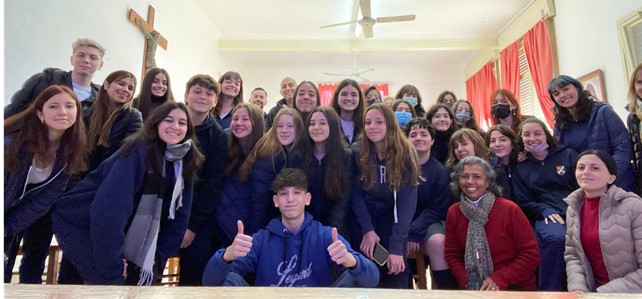
24 May IMMIGRANTS OF TODAY AND YESTERDAY/ARGENTINA
During the month of April my 4th year social studies students in Ituzaingó and I embarked on an ABP (project-based learning) on immigrants who arrived in our country at the end of the nineteenth century and the beginnings of the twentieth century. Our guiding question was “why did they leave their countries and choose to live in Argentina?” The war, the lack of work, the dreams of “hacerse la América” (“American Dream”) motivated many of them to abandon their homelands. Argentina was becoming enriched with the culture of the Spaniards, Italians, French….” With a great deal of creativity the work groups presented the knowledge they had acquired, and many were amazed at the richness and also at the sorrow involved in this process of immigration. In the self-evaluation they wrote:
“The project on immigrants had many positive aspects, I could learn more about the situations experienced by the immigrants of that time, and also about the history of Argentina and that of my own family.”
“Now I realize that emigrating from your country of origin is very hard, leaving behind your family, your culture, your language. It must be very painful.”
“In general I like the fact that it was a group project since we shared opinions, ideas and points of view about the topic with the group. Thanks to this work I learned, among other things, the different reasons why people emigrate and how they were received by their country of destination. I would like at some time to have a conversation with an immigrant, since I would like to know the experience of that person in particular.”
This last commentary motivated us to invite some immigrant friends to share with the group their own histories. We invited Lusine, an Armenian woman wo lives in the community of Ituzaingó, and Ivan and Henry, Venezuelans from the Las Tunas neighborhood. We got together on a Friday morning. There was an atmosphere of intensive listening, of those moments in which one feels that each person is speaking from the heart and that the words are echoing in the receptive ears of the young people. A beautiful miracle!
The Venezuelans surprised us with their famous “tequeños”, a delicious sandwich that the students had never tasted before. For an hour they shared with us a part of their histories, of their dreams, of everytihng it meant to leave their countries, of their experience in this land of Argentina at the southern tip of the world. We shared some of the commentaries of the students , which convinced us of how important it is to make this reality of immigrants better known. We learned that there is a lot to help them with and much more to thank them for.
“I was most impressed about the life style of Lusine, I saw that for her it was very hard, and she had to make too many sacrifices in Armenia as well as in Argentina. Also I was impressed how Ivan and Henry had an almost perfect life in Venezuela and then they had to change all of it in order to emigrate to a totally unknown country. The different points of view that they had among themselves helped me very much, but I see the common thread among them is that the most important thing is the family and that it is important to take good care of it.”
I was impressed by the stories of the three, which were very different, their reasons for leaving their country and moving to a better place. It helped me to learn about the life of these persons, what is difficult about their situations, but how they forged ahead and did not give up.”
“After listening to them, I realized that it is essential to be grateful in order to appreciate and and enjoy life to the fullest. Be thankful for what we are, what we achieve, what we have, for the persons around us.”
“Each one of the stories was very touching and it impressed me how fortunate I am to have my family nearby. I believe that things such as the Armenian genocide or the sad situation experienced in Venezuela has to become better known so that we may all help in whatever way we can.”
The ABP project was a success. Thank you to Lusine, Ivan and Henry for sharing with us a bit of your lives.
Zulema Ramirez, aci



